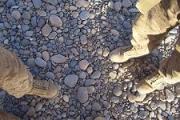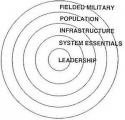than I expected at the end of 2003. So, you and others here can take credit for that.
My questions were more addressed to the political side of "best practices COIN" in general. I see some disconnects in the concept as laid out in FMI 3-24.3. For that matter, I see the same disconnects in the 1980s Summers-Krepinevich debate, and the current Gentile-Nagl debate - all very interesting from a military standpoint (the military effort); but without any real consideration by any of them as to the political effort required.
Most particularly, what do you do with an incompetent (corrupt, etc.) HN government ?
---------------------------------
I'd quibble about what what "expeditions" and "expeditionary forces" do. Of course they can invade with the purpose of occupying the country - we seem to be fixated on that, as opposed to a punitive raid no matter how gigantic it might be. FM 27-10 (par. 352 explains the distinction).
Coincidentally, I was just re-reading parts of Brian Linn's The Echo of Battle. At p.91, he deals with War Plan Green (a war with Mexico). We've had war plans for Mexico since the 1800s, but by 1922 the Mexican army was so weak that War Plan Green was changed to Special Plan Green, an occupation plan not unlike what we intended for Iraq: the army would establish a government, reform the education and legal systems, employ honest police and civil servants, with the clear and expressed US intention to create "peace and good order."
Now, it came to pass in 1924 that Special Plan Green was war gamed; and, surprise, the most probable COA for the Mexicans was not to resist the main invasion columns, but to wait a while and then engage in guerrilla warfare, etc. The majority staff conclusion was that the occupation would morph into a long, slow and frustrating unconventional war.
So, in 1927, Special Plan Green was amended to provide for a rapidly moving direct attack with the purpose of deposing the Mexican government, and then immediately withdrawing. The plan required that it be made clear that it did not intend a military occupation, was not an operation against the Mexican nation, but was an operation against the Mexican government.
OK, in Linn's terminology, I'm just a dinosaur "Guardian" of the "Never Again but" school, who apparently sees disconnects where others don't.
Regards
Mike






 ), and our shared marketing analysis/efforts seem to indicate that we understand/can reach the demographics of whom we wish to influence.
), and our shared marketing analysis/efforts seem to indicate that we understand/can reach the demographics of whom we wish to influence. 







Bookmarks